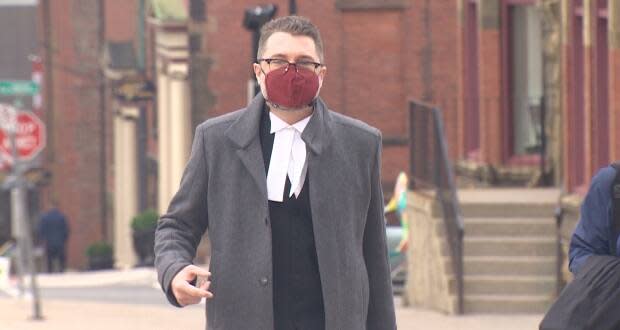Lawyers in boardwalk manslaughter case address whether fatal punch was self-defence
In closing arguments on Tuesday morning, Crown and defence agreed that the case against William Ronald Jordan comes down to two legal principles — consent and self-defence.
Essentially, did the victim, Anthony Dwyer, consent to a fight, and did Jordan's punch constitute self-defence?
Defence lawyer James McConnell was first to address the 11 jurors. He reminded them that many of the fundamental components of the case are not in dispute.
Nearly all of the witnesses agree that 54-year-old Dwyer first approached the 19-year-old Jordan, and that Dwyer was the first to use physical force by jabbing his fingers into Jordan's throat.
Jordan then punched Dwyer in the face, knocking him out instantly. As a result, Dwyer fell backwards and struck his head on the pavement, causing the injuries that led to his death.

McConnell said Dwyer was intoxicated on the night of July 13, 2018, and was upset his last cigar, which he had given to an acquaintance of Jordan's, had been given to Jordan. He said there was also "lingering anger" at being asked to leave a bar for being drunk.
In that frame of mind, Dwyer approached Jordan to get his cigar back, said McConnell.
He questioned why Dwyer would pick a fight "over something as trivial as a half-smoked cigar."
Dwyer demanded the cigar back and Jordan refused.
Although Jordan's two friends were standing in the same group, McConnell said Dwyer's focus "locked onto Will during this entire encounter."
Dwyer consented to fight, defence argues
He jabbed his fingers into Jordan's throat with enough force "to wind Will and force him back a step," said McConnell.
All that was supported by the surveillance video entered into evidence, he said.
McConnell also reminded the jury that in the four seconds between the jab to Jordan's throat and the punch to Dwyer's face, Dwyer threatened to rip off his testicles, according to Jordan's testimony.
Through his actions as the "aggressor," Dwyer consented to a fight, said McConnell.

Having instigated the interaction, he said, Dwyer must have reasonably expected physical force in response.
"By striking Will in the throat, he was implicitly consenting to physical force well beyond a shove," he told the jury.
McConnell explained that even if Dwyer consented to a fight, the defence of consent wouldn't apply if Jordan intended to cause serious bodily harm.
He said there was no evidence that Jordan was out looking for a fight or had a history of fighting. In fact, he testified that this was the first punch he had ever thrown.
"This punch was a panicked, defensive reaction by a skinny 19-year-old with no fighting experience in response to being struck in the throat and verbally threatened by a much older, larger, and erratically acting stranger," said McConnell.

In his closing remarks, Crown prosecutor Chris Ryan also talked about the legal principles of consent and self defence.
He said Dwyer did not consent to "a hard punch to the face."
But even if the jury believed that he had consented, that consent is negated because Jordan intended to cause serious bodily harm.
Ryan said a hard punch to the face was "unreasonable" under the circumstances because further force was not imminent. Jordan had other, "less drastic" means at his disposal, and the force he used was "disproportionate," given the initial force used by Dwyer.
Having shoved Jordan, Dwyer had consented to some level of force, said Ryan. But a hard punch to the face was excessive.
Help was nearby
"That responsive force from Mr. Jordan was both disproportionate and excessive. It went beyond what the law of self-defence permits."
Ryan told the jury that Jordan could have walked away, or he could have called for help. After all, his friends were right there with him, and three bouncers were nearby.
"Mr. Jordan did testify that he did not punch Mr. Dwyer out of anger," he said. "But we, the prosecution, ask you to not believe Mr. Jordan on this point. The prosecution's position is that Mr. Jordan punched Mr. Dwyer out of anger. He was upset that Mr. Dwyer was ruining his Friday evening on the boardwalk with his friends."
Ryan said Jordan was angry and intended to cause serious bodily harm and, therefore, must be found guilty of "unlawfully killing Anthony Dwyer."
Mr. Justice Darrell J. Stephenson is scheduled to give his final instructions to the jury on Wednesday morning.


